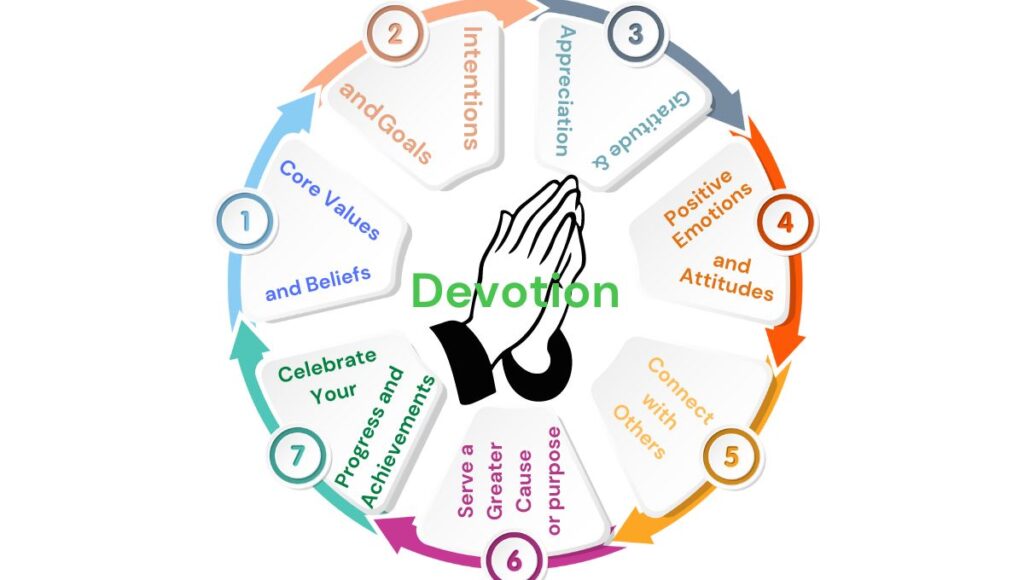Devotion: How to Achieve a Blissful State of Mind in 7 Easy Steps

Do you want to learn how to achieve a blissful state of mind with devotion? Do you want to experience more joy, peace, and fulfillment in your life? Do you want to feel more connected to yourself, others, and a higher purpose?
If you answered yes to any of these questions, then this blog post is for you. In this post, I will share with you what devotion is, why it is important for your mental health and well-being, and how you can achieve a blissful state of mind with devotion in 7 easy steps.
But before we dive into the steps, let’s first define what devotion is and why it matters.
What is Devotion and Why is it Important?
Devotion is a state of mind that involves being deeply committed, dedicated, and loyal to something or someone that you value and believe in. It is a feeling of love, admiration, and respect that motivates you to act in accordance with your values and goals. It is also a sense of gratitude, appreciation, and positivity that helps you enjoy what you have and what you achieve.
Devotion is important for your mental health and well-being because it can help you:
- Find your purpose and passion in life
- Pursue meaningful goals and intentions
- Cultivate positive emotions and attitudes
- Connect with others who share your devotion
- Serve a greater cause or purpose
- Celebrate your progress and achievements
- Achieve a blissful state of mind
A blissful state of mind is a state of mind that is characterized by happiness, satisfaction, and peace. It is a state of mind that allows you to experience the beauty and joy of life, regardless of external circumstances. It is a state of mind that enables you to live in the present moment, without worrying about the past or the future. It is a state of mind that empowers you to be the best version of yourself.
Sounds amazing, right? But how can you achieve a blissful state of mind with devotion? Well, that’s what I’m going to show you in the next section.
How to Achieve a Blissful State of Mind with Devotion in 7 Easy Steps

Achieving a blissful state of mind with devotion is not as hard as you may think. In fact, it can be done in 7 easy steps that anyone can follow. Here they are:
Step 1: Identify Your Core Values and Beliefs
The first step to achieving a blissful state of mind with devotion is to identify your core values and beliefs. These are the principles and convictions that guide your decisions and actions in life. They are the foundation of your devotion.
Some examples of common values and beliefs are:
- Honesty
- Integrity
- Compassion
- Courage
- Freedom
- Justice
- Faith
- Love
To discover your own values and beliefs, you can ask yourself questions like:
- What matters most to me in life?
- What do I stand for?
- What do I want to be remembered for?
- What makes me happy and fulfilled?
- What inspires me and motivates me?
Once you have identified your core values and beliefs, write them down and keep them in mind whenever you make choices or take actions. This will help you align your devotion with your true self.
Step 2: Set Meaningful Goals and Intentions
The second step to achieving a blissful state of mind with devotion is to set meaningful goals and intentions. These are the outcomes and directions that you want to achieve or pursue in life. They are the expression of your devotion.
Some examples of meaningful goals and intentions are:
- To learn a new skill or language
- To start a business or a project
- To travel the world or explore new places
- To improve your health or fitness
- To make a positive impact or difference
To set meaningful goals and intentions, you can ask yourself questions like:
- What do I want to achieve or accomplish in life?
- What do I want to experience or explore in life?
- What do I want to improve or change in myself or in the world?
- How do I want to grow or evolve as a person?
- How do I want to contribute or serve others?
Once you have set meaningful goals and intentions, write them down and break them down into smaller steps or tasks. This will help you plan your devotion and track your progress.
Step 3: Practise Gratitude and Appreciation
The third step to achieving a blissful state of mind with devotion is to practice gratitude and appreciation. These are the feelings and expressions of thankfulness and recognition for what you have and what you have achieved. They are the fuel of your devotion.
Some examples of how gratitude and appreciation can improve your mood and happiness are:
- They can make you more optimistic and hopeful
- They can make you more resilient and adaptable
- They can make you more generous and kind
- They can make you more satisfied and content
- They can make you more joyful and peaceful
To practice gratitude and appreciation daily, you can do things like:
- Keep a gratitude journal or list
- Say thank you to someone or something
- Write a thank you note or letter
- Give a compliment or praise
- Share a positive feedback or testimonial
Once you have practiced gratitude and appreciation, express them verbally or in writing. This will help you reinforce your devotion and spread positivity.
Step 4: Cultivate Positive Emotions and Attitudes
The fourth step to achieving a blissful state of mind with devotion is to cultivate positive emotions and attitudes. These are the feelings and perspectives that support your values, goals, and gratitude. They are the mindset of your devotion.
Some examples of positive emotions and attitudes are:
- Love
- Joy
- Peace
- Hope
- Faith
- Courage
- Confidence
- Curiosity
To cultivate positive emotions and attitudes, you can do things like:
- Meditate or pray
- Affirm or visualize
- Smile or laugh
- Sing or dance
- Play or have fun
Once you have cultivated positive emotions and attitudes, embody them in your actions and behaviours. This will help you manifest your devotion and attract positivity.
Step 5: Connect with Others Who Share Your Devotion
The fifth step to achieve a blissful state of mind with devotion is to connect with others who share your values, goals, gratitude, and positivity. These are the people who can enhance your sense of belonging, support, and inspiration. They are the community of your devotion.
Some examples of how connecting with others can benefit you are:
- They can provide you with feedback and advice
- They can provide you with encouragement and motivation
- They can provide you with accountability and responsibility
- They can provide you with collaboration and cooperation
- They can provide you with friendship and love
To find and connect with like-minded people, you can do things like:
- Join a group or a club
- Attend an event or a workshop
- Follow a blog or a podcast
- Subscribe to a newsletter or a magazine
- Follow a leader or an influencer
Once you have found and connected with like-minded people, communicate with them regularly and authentically. This will help you nurture your devotion and expand your network.
Step 6: Serve a Greater Cause or Purpose
The sixth step to achieve a blissful state of mind with devotion is to serve a greater cause or purpose that transcends your personal interests. This is the mission or vision that you want to fulfill or realize in life. It is the essence of your devotion.
Some examples of how serving a greater cause or purpose can enrich your life are:
- It can increase your sense of meaning and fulfillment
- It can increase your sense of impact and influence
- It can increase your sense of contribution and service
- It can increase your sense of alignment and harmony
- It can increase your sense of transcendence and spirituality
To find and serve a greater cause or purpose, you can do things like:
- Identify a problem or a need that you want to solve or meet
- Identify a passion or a talent that you want to share or use
- Identify a value or a belief that you want to uphold or promote
- Identify a vision or a dream that you want to create or achieve
- Identify a legacy or a message that you want to leave or deliver
Once you have found and served a greater cause or purpose, commit to it wholeheartedly and consistently. This will help you express your devotion and make a difference.
Step 7: Celebrate Your Progress and Achievements
The seventh and final step to achieve a blissful state of mind with devotion is to celebrate your progress and achievements along the way. These are the milestones and results that you reach or produce in life. They are the reward of your devotion.
Some examples of how celebrating your progress and achievements can boost your well-being are:
- It can boost your confidence and self-esteem
- It can boost your motivation and enthusiasm
- It can boost your satisfaction and happiness
- It can boost your recognition and appreciation
- It can boost your learning and growth
To celebrate your progress and achievements, you can do things like:
- Reward yourself with something that you enjoy or desire
- Share your success with someone who cares or supports you
- Celebrate with others who share your devotion or appreciate you
- Reflect on your journey and your learnings
Once you have celebrated your progress and achievements, acknowledge yourself and your devotion. This will help you appreciate your devotion and enjoy your bliss.
5 Common Mistakes People Make When Practicing Devotion

Devotion is a powerful way to connect with God, yourself, and others. It can help you grow spiritually, emotionally, and mentally. It can also bring you peace, joy, and fulfillment.
But devotion is not always easy. Sometimes, we make mistakes that can hinder our progress, frustrate our efforts, and diminish our results. These mistakes can prevent us from experiencing the full benefits of devotion.
In this blog post, I will share with you the 5 common mistakes people make when practicing devotion and how to avoid them. By learning from these mistakes, you can improve your devotion and achieve a blissful state of mind.
1st Mistake People Make When Practicing Devotion?
The #1 mistake people make when practicing devotion is not having a clear purpose or goal for their devotion. This mistake can lead to confusion, boredom, and disappointment.
Having a clear purpose or goal can help you focus, motivate, and measure your devotion. It can also help you align your devotion with your values and beliefs.
Some examples of common purposes or goals for devotion are:
- To know God better
- To grow in faith
- To find peace
- To express gratitude
- To seek guidance
- To overcome challenges
- To serve others
To set a clear purpose or goal for your devotion, you can do the following:
- Pray and ask God to reveal his will for your devotion
- Journal and write down what you want to achieve or accomplish through your devotion
- Use a devotional guide or book that provides a specific theme or topic for each day or week
Once you have set a clear purpose or goal for your devotion, write it down and keep it in mind whenever you practice your devotion. This will help you stay on track and enjoy your devotion.
2nd Mistake People Make When Practicing Devotion?
The #2 mistake people make when practicing devotion is not being consistent or disciplined in their devotion. This mistake can lead to inconsistency, procrastination, and guilt.
Being consistent or disciplined can help you develop a habit, deepen your relationship, and overcome challenges in your devotion. It can also help you experience the benefits of devotion regularly.
Some examples of common obstacles or excuses that prevent people from being consistent or disciplined in their devotion are:
- Lack of time
- Lack of energy
- Lack of interest
- Lack of motivation
- Lack of accountability
To be consistent or disciplined in your devotion, you can do the following:
- Schedule a specific time and place for your devotion every day or week
- Plan ahead and prepare the materials and resources you need for your devotion
- Prioritize your devotion and make it the first thing you do in the morning or the last thing you do at night
- Find an accountability partner who can check on you and encourage you to practice your devotion
- Reward yourself with something that you enjoy or desire after completing your devotion
Once you have been consistent or disciplined in your devotion, celebrate your achievement and acknowledge your effort. This will help you build confidence and momentum in your devotion.
3rd Mistake People Make When Practicing Devotion?
The #3 mistake people make when practicing devotion is not being flexible or adaptable in their devotion. This mistake can lead to rigidity, limitation, and stagnation.
Being flexible or adaptable can help you explore, learn, and grow in your devotion. It can also help you discover new ways to connect with God, yourself, and others.
Some examples of common rigidities or limitations that hinder people from being flexible or adaptable in their devotion are:
- Sticking to one method, format, source, or style of devotion
- Refusing to try new things, experiment with different options, or change what is not working
- Ignoring the feedback, suggestions, or recommendations of others who practice devotion
To be flexible or adaptable in your devotion, you can do the following:
- Try new things such as reading different versions or translations of the Bible, listening to different podcasts or music, watching different videos or movies, etc.
- Experiment with different styles such as meditating, praying, journaling, singing, drawing, etc.
- Change what is not working such as switching the time, place, duration, frequency, or intensity of your devotion
Once you have been flexible or adaptable in your devotion, reflect on your experience and learn from it. This will help you improve your devotion and find what works best for you.
4th Mistake People Make When Practicing Devotion?
The #4 mistake people make when practicing devotion is not being attentive or receptive to their devotion. This mistake can lead to distraction, resistance, and misunderstanding.
Being attentive or receptive can help you listen, understand, and apply what God is saying to you in your devotion. It can also help you receive his grace, love, and wisdom.
Some examples of common distractions or resistances that prevent people from being attentive or receptive in their devotion are:
- Noise from the environment, devices, or people
- Worries from the past, present, or future
- Doubts about God, yourself, or others
- Biases or prejudices that cloud your judgment
- Fears or insecurities that hold you back
To be attentive or receptive in your devotion, you can do the following:
- Find a quiet place where you can practice your devotion without interruptions or distractions
- Meditate and calm your mind and body before you start your devotion
- Ask questions and seek answers from God, yourself, or others
- Be open-minded and willing to learn new things, perspectives, or insights
- Be humble and ready to admit your mistakes, weaknesses, or needs
Once you have been attentive or receptive in your devotion, apply what you have learned or experienced to your life. This will help you grow in your devotion and live according to God’s will.
5th Mistake People Make When Practicing Devotion?
The #5 and final mistake people make when practicing devotion is not being expressive or responsive in their devotion. This mistake can lead to inhibition, restraint, and indifference.
Being expressive or responsive can help you communicate, appreciate, and worship God in your devotion. It can also help you express your feelings, thoughts, and desires.
Some examples of common inhibitions or restraints that stop people from being expressive or responsive in their devotion are:
- Fear of being judged, criticized, or rejected by God, yourself, or others
- Shame of being exposed, vulnerable, or imperfect in front of God, yourself, or others
- Pride of being self-sufficient, independent, or superior to God, yourself, or others
To be expressive or responsive in your devotion, you can do the following:
- Sing and praise God for who he is and what he has done for you
- Thank and appreciate God for what he has given you and what he will do for you
- Confess and repent of your sins and ask God for forgiveness and healing
- Ask and request God for what you need and want from him
- Surrender and trust God with your life and follow his guidance
Once you have been expressive or responsive in your devotion, enjoy the presence and peace of God in your heart. This will help you deepen your devotion and love God more.
Conclusion

Devotion is a wonderful way to connect with God, yourself, and others. It can help you grow spiritually, emotionally, and mentally. It can also bring you peace, joy, and fulfillment.
It is a state of mind that can help you achieve a blissful state of mind. It involves being deeply committed, dedicated, and loyal to something or someone that you value and believe in. It also involves being grateful, appreciative, and positive about what you have and what you achieve.
To achieve a blissful state of mind in your life, you can follow these 7 easy steps:
- Identify your core values and beliefs
- Set meaningful goals and intentions
- Practice gratitude and appreciation
- Cultivate positive emotions and attitudes
- Connect with others who share your devotion
- Serve a greater cause or purpose
- Celebrate your progress and achievements
By following these steps, you can experience more joy, peace, and fulfillment in your life. You can also feel more connected to yourself, others, and a higher purpose. You can also live in the present moment, without worrying about the past or the future. You can also be the best version of yourself.
But it is not always easy. In this blog post, I have also shared with you the 5 common mistakes people make when practicing devotion and how to avoid them. By learning from these mistakes, you can improve your devotion and achieve a blissful state of mind.
The 5 common mistakes are:
- Not having a clear purpose or goal for your devotion
- Not being consistent or disciplined in your devotion
- Not being flexible or adaptable in your devotion
- Not being attentive or receptive in your devotion
- Not being expressive or responsive in your devotion
So, what are you waiting for? Start your journey of devotion today and achieve a blissful state of mind. You deserve it.
I hope this blog post was helpful for you. If you liked it, please share it with your friends and family. And if you have any questions or comments, please leave them below. I would love to hear from you.
Thank you for reading and have a wonderful day.

FAQs
What are some benefits of doing devotions regularly?
Doing devotions regularly can help you grow in your relationship with God, deepen your understanding of his word, strengthen your faith, and enrich your life. Devotions can also help you cope with stress, overcome challenges, and find peace and joy.
How can I make my devotions more interesting and engaging?
You can make your devotions more interesting and engaging by varying your methods and materials. For example, you can use different versions or translations of the Bible, read different genres or books of the Bible, use different devotional books or study aids, listen to different podcasts or music, or try different forms of prayer or meditation. You can also experiment with different creative ways to express your devotion, such as writing, drawing, singing, or dancing.
How can I share my devotions with others?
You can share your devotions with others by inviting them to join you in your devotional time, by discussing what you learned or experienced with them, by sending them a verse or a quote that inspired you, by praying for them or with them, or by showing them your love and care through your actions. Sharing your devotions with others can help you build stronger bonds, encourage one another, and witness to your faith.



